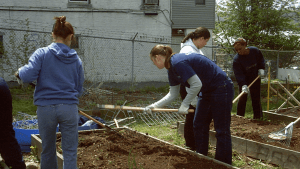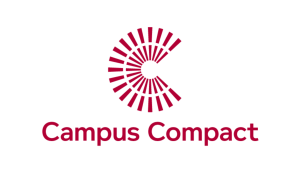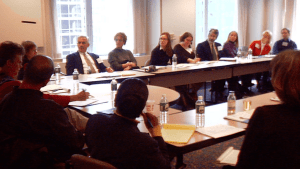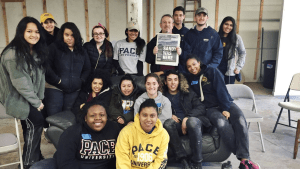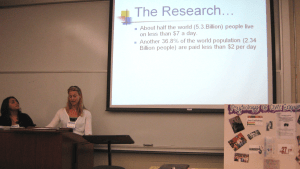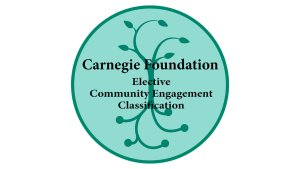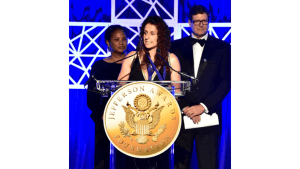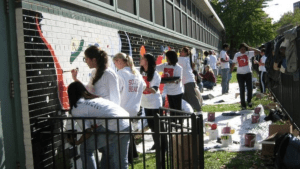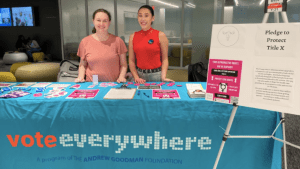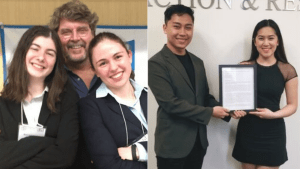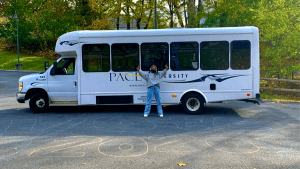The Center for Community Action and Research:
Changing Lives for 25 Years
and Counting
For a quarter century, CCAR has been the cornerstone
of civic engagement and experiential learning at Pace.
“I don’t think I would have changed my minor to political science or gone to law school if it weren’t for CCAR,” said Stout, who was a founding partner of the immigration law firm Darian Stout, LLC, and now works for Vinco, an organization that helps prepare aspiring lawyers for law school and the bar exam.
Stout’s journey with CCAR has come full circle—as an adjunct professor at Pace, she teaches a civic engagement course in political science that partners with CCAR for the community-based learning component of the course.
“You can’t help but be proud when you work with someone as a student and they become a future colleague,” said CCAR’s Director Heather A. Novak ’05, MPA. “There are so many stories like that at Pace.” Novak has worked at Pace since 1999—nearly as long as the Center has been in existence. She began teaching civic engagement courses in 2006 and was promoted to CCAR director in 2019.
“The impact of CCAR’s work over the past quarter century cannot be understated,” said Dyson College of Arts and Sciences and School of Education Dean Tresmaine R. Grimes, PhD. “The Center’s tireless commitment to serving our surrounding communities and providing life-changing opportunities for our students makes it one of Dyson’s distinctive hallmarks.”
CCAR Timeline
Since its founding in 1997, the Center for Community Action and Research (originally VIA Pace) has continued to evolve in its commitment to advancing civic engagement for the entire Pace community.
For the Greater Good
Since its founding in 1997 by former Dyson College Dean Charles Masiello, CCAR—originally named VIA PACE (Volunteers in Action) —has continued to evolve in its programming, offerings, and mission to meet the needs of our ever-changing world.
At the heart of CCAR is a commitment to serving the communities that surround Pace in Westchester and New York City. Each year, through civic engagement courses and independent service events, CCAR connects students, faculty, and staff to a myriad of opportunities to engage in community-based learning—including working at food pantries and homeless shelters, leading voter registration efforts, aiding in disaster relief, conducting research for nonprofit organizations, and assisting in sustainability and conservation projects.
“I know CCAR has equipped me with tools to keep going in my volunteer and community-building work, and I can’t wait to improve upon them moving forward,” said CCAR student employee Britney Peralta ’22, Economics and Communication and Media Studies. “I am gaining experience in a possible area I’d like to further pursue and growing as an advocate for my community.”
CCAR By the Numbers
53,200
Number of student service hours contributed via CCAR service events and Civic Engagement courses
22
Average number of community service hours per student
103
Number of service-learning course sections
1,733
Number of students attending CCAR’s civic engagement programs
$1,593,340
Total dollar value of service to community partners*
*includes CCAR service programming and Civic Engagement and Public Values courses. Based on a valuation tool provided by Independent Sector
Life-changing Experiences
CCAR has transformed the goals, aspirations, and perspectives of countless members of the Pace community.
For instance, Becker landed an internship with the NYRP this spring as a direct result of her time in Toomey’s civic engagement course.
“The course took what I love about working with people and my love of science and mixed them together,” said Becker. “It impacted not only my future career but my entire future in general. I want to make sure advocacy continues to be a huge part of my life.”
And like lawyer and civic engagement professor Stout, Jandery De La Cruz ’12, ’17, Communications, MPA, found her calling in serving others through her time with CCAR.
“CCAR is why I’ve chosen this career path,” said De La Cruz, now the manager of volunteer services and food pantry programming at Feeding Westchester. “Before CCAR, I was unaware of what volunteering meant, not only to the organization, but to myself. Without CCAR, I probably wouldn’t know what it feels like to put myself out there and develop new skills, be selfless, and provide support and helpful hands to those in our own community.”
Learning That Transcends Classroom Walls
As part of an initiative driven by the leadership of Pace faculty and supported by CCAR, each undergraduate student at Pace is required to take a civic engagement and public values course. These courses are offered in each of Pace’s schools and colleges and are designed to transcend the classroom walls and challenge students to address real-world issues, with experiences that facilitate partnerships with community organizations.
“Experiential learning motivates learners to reflect on their educational experience for the creation of new skills, attitudes, and ways of thinking,” said Assistant Professor of Environmental Studies Anne Toomey, PhD, who teaches a civic engagement course called Citizen Science, alongside Assistant Professor of Environmental Studies Monica Palta, PhD.
In total, 103 civic engagement courses were offered for the 2021–22 school year, including 78 housed in Dyson, ranging from Animals and Society to Women in Literature to Theater of the Oppressed. “These experiences are the ones that students remember, where they can translate the concepts learned in the classroom into practice,” said Toomey.
For example, in Toomey and Palta’s course, students observed and studied the usage of Sherman Creek Park along the Harlem River in upper Manhattan and presented their findings to the New York Restoration Project (NYRP), a nonprofit organization that cares for green spaces around the five boroughs.
“The NYRP is using the information we gave them to have a direct, real impact on the park and on the community,” said a student in the course, Cam Becker ’23, Environmental Studies. “The real-life implication of this will stick with me probably forever. It teaches you not only the skills you need, but also that if you offer, people always need help.”
“Before CCAR, I was unaware of what volunteering meant, not only to the organization, but to myself. Without CCAR, I probably wouldn’t know what it feels like to put myself out there and develop new skills, be selfless, and provide support and helpful hands to those in our own community.”
—Jandery De La Cruz ’12, ’17
Moving Forward
After 25 years, Center Director Novak believes CCAR’s role is more important than ever.
“In supporting Pace students and faculty who are building meaningful partnerships with community-based organizations, we are enabling community connections that are vital for meeting the challenges of today’s world,” said Novak.
In fall 2021, Pace University unveiled its new strategic plan, Pace Forward, touting experiential learning as one of the primary strategic priorities for the University.
Novak notes that, in alignment with those strategic aims, CCAR’s long-term goals include continued advocacy and support for opportunities that value knowledge, experience, and leadership, as well as forging reciprocal partnerships that serve community-identified goals and fostering recognition of those who exemplify CCAR’s mission.
In the short term, plans to advance those goals include assessing civic engagement courses, advocating for increased paid opportunities for students to do community-based work, expanding community partnerships to cover a greater diversity of issues, and targeting voter education efforts to reach students in majors who statistically vote at a lower rate than their peers.
Novak knows that CCAR’s first 25 years have poised the Center to adapt and grow as the world continues to change. “I continue to be inspired by members of Pace who are pushing conversations about access to opportunity, sustainability, and equity, and who are working with our communities not only to deal with, but to imagine new solutions to the obstacles that lie ahead, regardless of what major or career they have chosen.”

